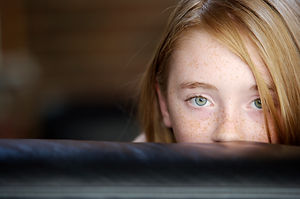
Trauma and attachment informed family placements for children and young people with complex needs


Let's go all chameleon
Chameleons, contrary to popular belief, do not automatically change colour to match their background. This is a gift they reserve in response to changes in light, temperature, when fearful or amorous and needing the affections of the opposite sex. You see, they do not change to hide; neither do they change to meet every need or circumstance. Unlike human beings, who appear predisposed with a need to please others through convention and social nicety, chameleons only change in circumstances critical to their well-being or survival.
In our primal state human beings are not dissimilar – I once read that we are born with only 2 immediate fears – noise and falling. Other fears are learnt as we grow – some spontaneous, such as blushing and some practiced, such as my 5’10” fear of a 1.2cm spider. I rather like the parallel drawn, other than agreeing with self that changing colour when touched by “amour” might have led to more trouble than love in younger years… We are in the end a combined product of nature and nurture, which offers explanations many for our own behaviours and those of our foster children.
I think as a foster carer I can learn a lot from the chameleon by accepting it is okay to act only on instinct and to sometimes shed self-imposed social niceties. Examples of such behaviour would include accepting it is okay to be seen in sweat pants and t-shirt, that make-up – with which I have always had an awkward relationship – is not obligatory to social acceptance and dust is okay (after all it never did Quentin Crisp any harm). Due to the aforementioned self-imposed social niceties the first 6 months of foster placement were exhausting – the hoover was almost as tired as me and Boots No 7 did a roaring trade. I had decided that a semi- polished finish to both house and self were necessities in view of the crocodile of professionals who wound through our home at regular intervals to cogitate, remunerate, inspect, discuss, strategies and drink tea. No disrespect intended to any readers that formed part of the crocodile – the observation is back at me and not at you!
I regale the benefits of “going all chameleon” like I have changed, to be honest I haven’t – and have perhaps got a little worse. You see my attention to inane domestic detail is the way I dissipate stress. Where I have changed however is in my ability to accept the outward social appearance of others. Our foster child Charlie acted only on instinct. He had not enjoyed enough benefit of natural support, acceptance and that critical parental attachment to act in any other way. Like a cobra he rested when left and reared up and spat when feeling threatened. He spat words like hot coals, telling us to keep our distance or suffer consequences. He used whatever small amount of power life afforded him to remind himself that, in the chaos that was his life, he had at least some control. This took the form of actions that make social acceptability squirm – refusal to shower, refusal to brush teeth, reminding anyone who would listen what huge fails they were, that they were gay, retarded or just plain stupid.
The control Charlie exercised over me – having quickly learnt it was my Achilles heel – was to keep his fingernails dirty. Dirty fingernails, to someone who works in a world inhabited by infection control specialists and microbiologists, are swamps of gram positive and gram negative infections, digits capable of visiting noro virus, swine flu or dysentery at a swipe. It took all my inner strength to accept that in the early days the benefits of Charlie eating something with dirty finger nails far outweighed the disadvantage of not eating. Trying to secure a win on the fingernails front would have led to defeat on all fronts. It was a case of picking my battles carefully and avoiding situations where defeat would be inevitable – at the outset it felt like these situations far outweighed the wins! My aversion to dirty finger nails was a learnt, rather than instinctive reaction. I thought clean finger nails were needed because my mum had time to tell me cleanliness mattered and why. Charlie’s mum’s life was one of substance dependency, laced by addictions that put themselves – and not Charlie – first. Charlie was lucky to eat every day, and lived – like a Chameleon – responding to circumstances that determined his survival. His putting a proverbial two [dirty] fingers up at me demonstrated that they were the least of his concerns, and for a short time at least they needed to be the least of mine.
90% of the time Charlie’s fingernails are trim and clean now. We left a small pot of warm water, nail brush, blunted toothpicks and hand cloth on the kitchen side every day for eight weeks. For eight weeks Charlie emptied the water, discarded the cloth and toothpicks and looked sideways at me to gauge reaction. My reaction was not chameleon, it was learnt. I smiled and asked “Maybe tomorrow?” Week nine and Charlie allowed me to clean his nails – or should I say nail, because we only cleaned one nail on our first attempt – apparently it “hurt like hell” – and I can’t remember how long it took before we completed both hands. What I do know is what began as distracting chatter the first time we tackled his nails had turned into valuable conversation by the time all nails were cleaned. We shared stories about friends, sometimes even family, laughed a little one time but – most importantly – over 10 dirty finger nails we began to build trust and respect for each other. He trusted I wouldn’t hurt him and I respected the way he let me into his world and dropped his instinctive chameleon-like defences, even if only for a short time in the beginning.
It is the small and less obvious things that have made our fostering journey so interesting and ultimately rewarding. Who would have thought there would be so much payback from allowing a child to keep his finger nails dirty for so long, but payback there was.